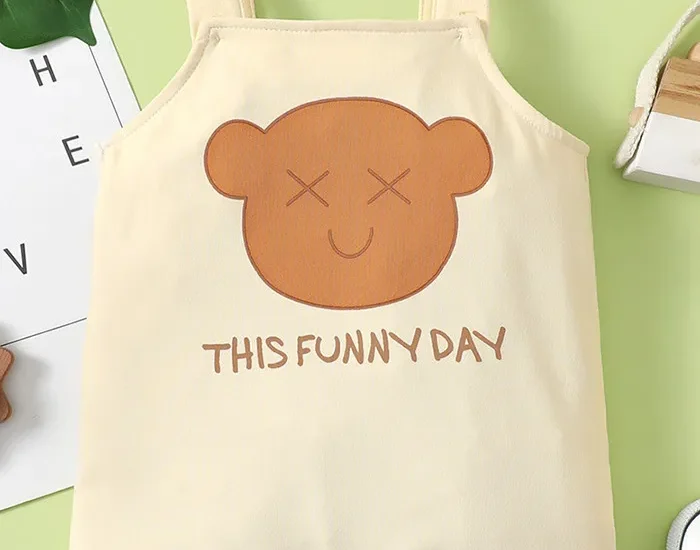Sustainable Wholesale Babies Clothing

As the world becomes more conscious of the environmental impact of the fashion industry, sustainable and ethical practices are gaining importance in every aspect of the industry, including the wholesale babies clothing market. With consumers increasingly seeking eco-friendly products for their little ones, it is important for small businesses in the industry to prioritize sustainability. Sustainable wholesale babies clothing involves using environmentally friendly materials, minimizing waste, and promoting ethical manufacturing processes.
By choosing sustainable wholesale babies clothing, businesses can reduce their carbon footprint, appeal to conscious consumers, and contribute to a healthier planet for future generations. In addition, ethical manufacturing practices can help ensure that the products being sold are made by workers who are treated fairly and paid living wages. In this blog post, we’ll explore the importance of sustainable and ethical practices in the wholesale babies clothing industry, and provide tips on how small businesses can incorporate these practices into their operations.
What Is Sustainable Wholesale Babies Clothing?
As consumers become more conscious of their environmental impact, sustainable fashion is gaining popularity across all demographics. The same is true for babies’ clothing. Sustainable wholesale babies clothing is a growing trend that focuses on using eco-friendly materials and manufacturing processes to create clothing for infants and young children. This approach considers the impact of every step of the production process, from the sourcing of raw materials to the disposal of the final product.
The goal is to create clothing that is gentle on the environment and safe for babies to wear. By prioritizing sustainable practices, wholesale babies clothing companies can reduce their carbon footprint and promote responsible consumption. In this blog post, we’ll explore the key features of sustainable wholesale babies clothing, the benefits of choosing this type of clothing, and how small businesses can incorporate sustainable practices into their product offerings.
Environmental Benefits Of Sustainable Wholesale Babies Clothing
Sustainable wholesale babies clothing is a growing trend in the fashion industry. Many consumers are becoming more conscious about the environmental impact of their purchasing choices, and this includes the clothing they buy for their babies. There are several environmental benefits to choosing sustainable wholesale babies clothing.
Firstly, sustainable clothing is often made from eco-friendly materials such as organic cotton, bamboo, or recycled fabrics. These materials have a lower environmental impact than conventional materials such as polyester, which requires high energy and water use to produce.
Secondly, sustainable clothing is often produced using eco-friendly manufacturing processes. This can include using renewable energy sources, reducing waste and water usage, and ensuring safe working conditions for employees.
Lastly, sustainable clothing is often designed to last longer than fast fashion items. This means that consumers will need to replace their baby’s clothing less frequently, reducing the amount of clothing that ends up in landfills.
Overall, sustainable wholesale babies clothing offers a more eco-friendly option for consumers who want to reduce their environmental impact. By choosing sustainable clothing, we can help preserve the planet for future generations.
Social Benefits Of Sustainable Wholesale Babies Clothing
Sustainable wholesale babies clothing is not only good for the environment, but it also has social benefits. By supporting sustainable practices in the babies clothing industry, we can promote fair labor practices and improve the lives of workers. Sustainable clothing companies often work with local communities to source materials and labor, providing fair wages and stable employment.
This can help support local economies and reduce poverty. Additionally, sustainable clothing is often made with non-toxic and biodegradable materials, which can reduce exposure to harmful chemicals and promote better health for workers and consumers alike. Finally, supporting sustainable wholesale babies clothing can promote awareness and education about sustainability and encourage a more responsible and ethical approach to consumption. By choosing sustainable wholesale babies clothing, we can promote positive social change and help create a more just and equitable world.
How To Identify Sustainable Wholesale Babies Clothing
As a retailer, it’s important to prioritize sustainability and ethical manufacturing practices when choosing wholesale babies clothing. Here are some tips for identifying sustainable options:
Look for organic or natural fibers, such as cotton or bamboo, that are grown without harmful pesticides and chemicals.
Check for certifications, such as GOTS (Global Organic Textile Standard) or Oeko-Tex, which ensure that the clothing has been produced using environmentally friendly and socially responsible practices.
Research the manufacturer’s labor practices, ensuring that workers are treated fairly and paid a living wage.
Consider the packaging materials used by the manufacturer and choose those that prioritize sustainable options, such as recycled materials.
Look for companies that prioritize transparency and are willing to provide information about their supply chain and manufacturing processes.
By prioritizing sustainability in your wholesale babies clothing purchases, you can feel confident that you are making a positive impact on the environment and supporting ethical manufacturing practices.
Sustainable Fabrics For Babies Clothing
When it comes to babies’ clothing, sustainable fabrics are becoming increasingly popular due to their eco-friendly properties. Organic cotton, bamboo, hemp, and linen are some of the most sustainable fabric options for babies’ clothing. Organic cotton is grown without harmful chemicals and is soft and comfortable for babies. Bamboo is a renewable resource that grows quickly, and its fibers are naturally antibacterial and moisture-wicking. Hemp is also a renewable resource that requires little water and no pesticides or herbicides to grow.
Linen is a durable fabric that requires fewer resources to produce than cotton and has natural cooling properties. Choosing sustainable fabrics for babies’ clothing not only benefits the environment but also ensures that babies are not exposed to harmful chemicals and synthetic materials. By opting for sustainable fabrics, parents can promote a healthier future for their babies and the planet.
The Impact Of Fast Fashion On Babies Clothing
Fast fashion has had a significant impact on the babies’ clothing industry. The demand for inexpensive, trendy clothing has led to increased production and consumption, resulting in negative effects on the environment and human rights. Cheap labor and poor working conditions are common in fast fashion production, and the use of synthetic materials and chemicals can harm the environment.
Additionally, the fast-paced nature of the industry can result in poor quality and unsafe products for babies. As consumers become more aware of these issues, there is a growing demand for sustainable and ethical babies clothing. By choosing to support sustainable and ethical brands, consumers can help mitigate the negative impact of fast fashion on the babies clothing industry and promote a more responsible and sustainable approach to fashion.
Alternatives To Fast Fashion For Babies Clothing
Fast fashion has been criticized for its negative impact on the environment and labor practices. Fortunately, there are alternatives to fast fashion for babies clothing.
Sustainable Fabrics: Look for clothing made from sustainable fabrics such as organic cotton, hemp, and bamboo. These fabrics are eco-friendly and gentle on babies’ delicate skin.
Handmade Clothing: Consider purchasing handmade clothing from small businesses or crafters. This option supports local artisans and ensures unique, one-of-a-kind pieces.
Secondhand Clothing: Shop for gently used baby clothes at consignment stores or online marketplaces. This option reduces waste and saves money.
Renting Clothing: Consider renting baby clothing for special occasions or for a limited time. This option is cost-effective and reduces the environmental impact of fast fashion.
Clothing Swaps: Host or attend clothing swaps with other parents to exchange baby clothes that no longer fit. This option is fun and social, and reduces waste.
By choosing alternatives to fast fashion for babies clothing, parents can help protect the environment and support ethical and sustainable manufacturing practices.
Sustainability Certifications For Babies Clothing
Sustainability certifications are becoming increasingly important in the babies clothing industry. These certifications ensure that the production process of the clothing is environmentally and socially responsible. The Global Organic Textile Standard (GOTS) is a leading certification for sustainable textiles, including babies clothing. GOTS-certified products must meet strict environmental and social criteria, including the use of organic materials, fair labor practices, and safe working conditions. Another certification to look for is the OEKO-TEX Standard 100, which tests for harmful substances in the clothing.
Additionally, the Fairtrade certification guarantees fair prices and working conditions for farmers and workers involved in the production of the clothing. By choosing sustainable and certified babies clothing, parents can ensure that their child’s clothing is not only safe and comfortable but also ethically and environmentally responsible. As a business, obtaining these certifications can also help you attract environmentally conscious customers and demonstrate your commitment to sustainability.
The Future Of Sustainable Wholesale Babies Clothing
The future of sustainable wholesale babies clothing looks promising as consumers are becoming more conscious of their environmental impact. Brands are investing in eco-friendly materials and ethical manufacturing processes to meet this demand. Additionally, technology is playing a vital role in the development of sustainable clothing, with innovative materials being created from natural resources like bamboo, organic cotton, and recycled plastics. There is also a focus on reducing waste through circular fashion initiatives and upcycling. Sustainable wholesale babies clothing is not only good for the environment, but it’s also good for business as it appeals to eco-conscious consumers who are willing to pay a premium for sustainable products.
As the demand for sustainable clothing continues to grow, we can expect to see more innovation and investment in this area, making sustainable wholesale babies clothing a viable option for businesses looking to make a positive impact while generating profits.
Conclusion
In conclusion, wholesale babies clothing is an exciting and lucrative industry with many opportunities for small business owners. By choosing the right suppliers, staying on top of the latest fashion trends, and employing effective marketing strategies, small businesses can thrive in this competitive market. Additionally, with the growing demand for sustainable and ethical clothing, there is a great opportunity for businesses to invest in eco-friendly materials and manufacturing processes. The future of sustainable wholesale babies clothing looks bright, and businesses that prioritize sustainability are likely to see increased demand from eco-conscious consumers. Overall, by keeping up with the latest trends and adopting sustainable practices, small businesses can succeed in the wholesale babies clothing industry while also making a positive impact on the environment and society.









